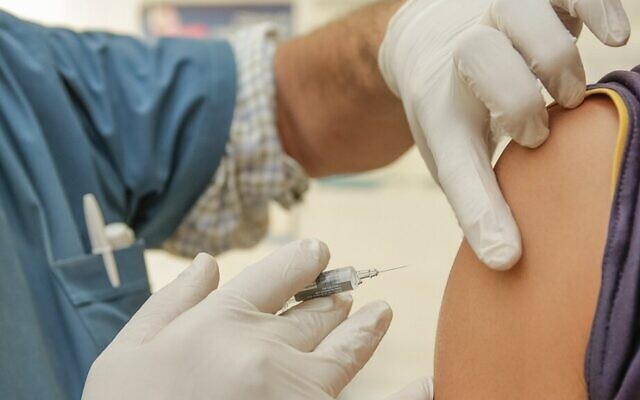Injecting More Vaccine into Georgia
Even with an announced infusion by the federal government, the governor says demand for COVID-19 vaccine will continue to outstrip supply.
Dave Schechter is a veteran journalist whose career includes writing and producing reports from Israel and elsewhere in the Middle East.
Update as of Feb. 4: Gov. Brian Kemp said Feb. 3 that the state had passed the 1 million mark in doses of COVID-19 vaccines. Even though the increased allotment from the federal government will reach 154,000 doses per week, “Our demand is drastically outpacing the supply that we’re seeing in our state,” Kemp said. The governor said that it could be two to three weeks until the state has enough vaccine to expand the recipient pool to include teachers and other essential workers. As of Feb. 3, the Georgia Department of Public Health reported 759,228 confirmed cases of COVID-19 and 12,907 COVID-related deaths.
Check out your Facebook friends or your Nextdoor neighbors and you’ll find plenty of complaints about the difficulty scheduling COVID-19 vaccinations, along with hot tips on where inoculations might be available.
The frustrated are driving well beyond metro Atlanta, to anywhere they can schedule their first vaccine shot, even if they must return in a month’s time for the second. People are waking in the pre-dawn dark in hopes of scoring online when a county or grocery opens appointments.
There is no debate that — to date — Georgia has not received enough vaccine from the federal government, even to vaccinate the highest priority group. “We need more vaccine. That is one of the biggest problems we have in the state,” Dr. Carlos del Rio, executive associate dean of the Emory School of Medicine at Grady Memorial Hospital told a Jan. 21 briefing hosted by the medical school.

Relief may come soon. The Biden administration Jan. 26 announced plans for a three-week increase of 16 percent in the quantity of vaccine allocated to the states. Georgia’s weekly allotment will rise from 120,000 to 145,900 doses. “Although we still expect demand to far exceed supply for the foreseeable future, this is no doubt welcome news and we will work around the clock to get these vaccines distributed and safely administered, as quickly as possible,” Gov. Brian Kemp said in response the same day.
The White House also announced plans to purchase 100 million more doses each of the Pfitzer/BioNTech and Moderna vaccines. Those 200 million doses will increase the U.S. supply by 50 percent beyond the 400 million purchased by the Trump administration. “With these additional doses, the U.S. will have enough vaccine to fully vaccinate 300 million Americans by the end of this summer,” the statement said.
Georgia’s post-holidays COVID-19 crisis may have passed, albeit with a tragic caveat. “So while we may have crested for hospitalization and cases, it looks like we are surging now for deaths,” Amber Schmidtke, a public health microbiologist and immunologist said at the Emory briefing. “Deaths are a delayed or a lagging indicator, and they tend follow that trend on a two-to-three-week delay.”
The Georgia Department of Public Health Jan. 27 reported 731,826 confirmed cases of COVID-19 and 12, 135 COVID-related deaths.
Schmidtke warned of a potential cloud that comes with a silver lining of declining case and hospitalization rates. “What tends to happen is that people see we’re on the downhill and they start to loosen up; they start to take more risks.”

Kemp delivered a similar message at a Jan. 21 news conference. “I want to be clear with Georgians watching this,” he said. “Our hospitals cannot handle another surge in COVID-19 patients on top of their current workload.”
GDPH reported that, as of Jan. 26, it had administered 746,274 doses of the two available vaccines, at a pace that has elevated Georgia toward the middle of the pack in vaccination rates among the states.
There may be another vaccine coming. Johnson & Johnson is expected soon to seek emergency use authorization — the same granted Pfizer/BioNTech and Moderna — for its single-dose vaccine.
The size of Georgia’s priority group increased significantly on Dec. 30, when Kemp added people age 65 and older, and their caregivers, to Tier 1a, which already included healthcare workers, residents and staff at long-term care facilities, and law enforcement and fire personnel.
Kemp said Jan. 26 that the state was not even halfway through vaccinating the approximately 2 million people in Tier 1a, of whom as many as 1.6 million may be age 65 and older. At two doses each, vaccinating the 65+ population alone would require some 3.2 million doses.
Schmidtke told the Emory briefing, “The pandemic has really shown us a bright spotlight on many of the deficiencies of our public health infrastructure.”
GDPH Commissioner Dr. Kathleen Toomey cited her agency’s computer system as an example. “That worked beautifully for tracking 80 cases of Legionella disease, . . . or the 18 cases of measles we had last year,” she told a Jan. 19 legislative hearing about her agency’s budget. “It was not able to easily track and continue to monitor what has now become almost 700,000 cases of COVID. That’s just the confirmed cases,” she said.

“That’s my first example of how the infrastructure of public health was just not designed for this kind of response, and we have had to use federal dollars and work with foundations, as well, to try to enhance the ability to collect this data, report this data, in the most timely and efficient and accurate way.”
Toward the end of January, the cost of responding to the COVID-19 pandemic became a hot topic in the state legislature, with a growing cry among legislators and public health professionals that Georgia relies too heavily on federal largesse to finance public health programs.
The House on Jan. 28 passed, by a 149-20 margin, and sent to the Senate an amended spending plan for the remainder of fiscal year 2021 that tacked on $33 million from state coffers to the GDPH budget.
The debate will carry over to consideration of Kemp’s proposed budget for fiscal year 2022, which called for increasing state funds earmarked to GDPH by just 0.3 percent (three-tenths of 1 percent). In response to critics, the governor’s office said that the state monies expended on public health would be supplemented by about $1 billion in anticipated federal funds.
Fiscal year 2021 ends June 30 and fiscal 2022 begins the next day, and under state law, the Legislature must pass those budgets before the end of its session, scheduled for April 2.




comments